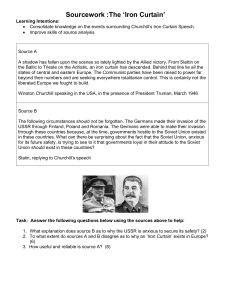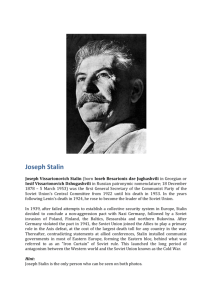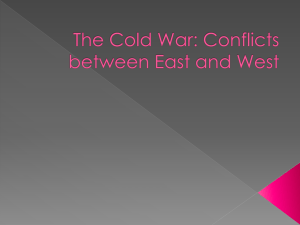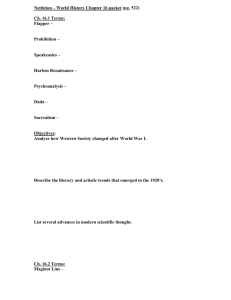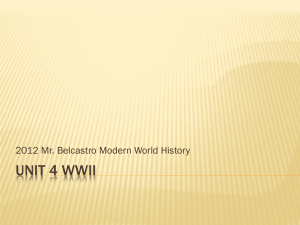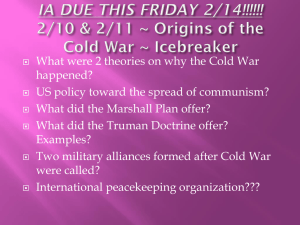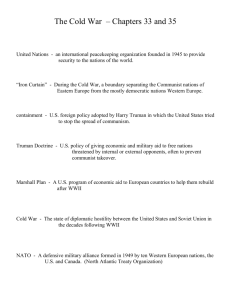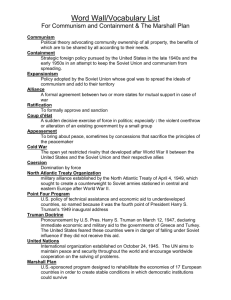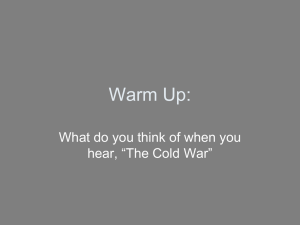Episode 2 - Iron Curtain Q's
advertisement
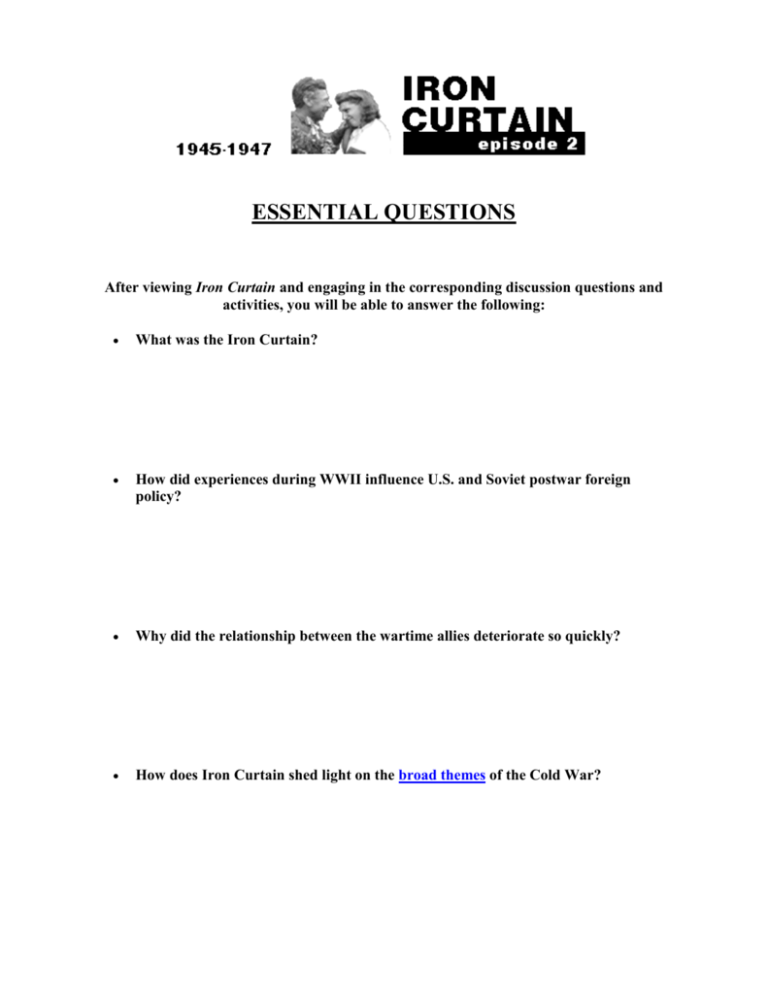
ESSENTIAL QUESTIONS After viewing Iron Curtain and engaging in the corresponding discussion questions and activities, you will be able to answer the following: What was the Iron Curtain? How did experiences during WWII influence U.S. and Soviet postwar foreign policy? Why did the relationship between the wartime allies deteriorate so quickly? How does Iron Curtain shed light on the broad themes of the Cold War? SEGMENT SUMMARIES & DISCUSSION QUESTIONS Segment One As Americans come home from WWII, they return to a country stronger and wealthier than ever before. War and the postwar rush to spend put capitalism back on its wheels. While the United States lost nearly 300,000 soldiers to the war, the Soviet Union lost 27 million citizens during this period - more than one-tenth of its population - through combat and Stalin's political liquidations. Nearly 70,000 towns and villages had been destroyed. 1. How did the American soldiers' experience on returning from WWII compare with that of Soviet soldiers' experience? 2. According to eyewitnesses, how did the Soviet soldiers treat the Berliners? 3. What happened to Germany and its capital Berlin as a result of having lost the war? 4. What changes were made to the boundaries of Germany and Poland? 5. Consider the casualty figures for the war and make inferences about the following questions: How might the fact that the Soviet Union lost 27 million people affect its policies following the war? What would you expect the Soviet Union to want after the war? How might these needs compare with those of the United States following the war? Segment Two A Greek civil war threatens Britain's oil route from the Middle East through the Mediterranean. Britain's intervention in this civil war is costly. Meanwhile, with troops located in most of Eastern Europe, the Soviet Union now dominates the countries along its western border. Stalin claims to fear encirclement by the capitalist powers. 6. Why did Great Britain intervene in the Greek civil war? What was the relationship between the Soviet Union and the countries it occupied along its western border? 8. According to the video, what were Stalin's fears in the years immediately following the war? Based on eyewitness reports, how did Stalin act on those fears? 7. Segment Three Devastated by the war, Poland has no choice but to accept a close alliance with the Soviet Union. Stalin promises to defend the new Polish frontiers against any German attempt to win back lost territory. 9. What was the condition of Poland immediately following the war? 10. What was the relationship between Poland and the Soviet Union after the war? 11. What were the experiences of the Polish people during the war (Episode 1)? How might these experiences affect their postwar relationship? Segment Four Stalin warns that capitalism and imperialism make future wars inevitable. George Kennan analyzes the Soviet Union's intentions in an 8,000-word prophecy that the Soviet Union would seek to extend its influence throughout the world, and must be contained. Days later, Winston Churchill delivers his "Iron Curtain" speech to a college audience in Fulton, Missouri. 12. According to the video, what were the various interpretations of Stalin's Bolshoi Theater speech in 1946? 13. Who was George Kennan and what was his perspective on Soviet intentions? On what did he base his recommendations for a U.S. response? 14. Use the map to follow Churchill's Fulton, Missouri, speech. What "facts" does Churchill tell his audience? Why did Truman think that the American public was not ready for this speech? 15. According to Robert Tucker, what was the Soviet response to the "Iron Curtain" speech? Segment Five Conflicts between the Soviet Union on one hand and the United States and Britain on the other arise in Turkey and Iran. Stalin tries to gain a military presence in both countries but the Western allies seek to keep both free from Soviet influence. In a report to President Truman, Clark Clifford and George Elsey conclude that the Soviet Union "constitutes a real menace to freedom in this world," but that "a war with the USSR would be more total, more horrible, than anything previously known." 16. Locate Turkey, the Dardanelles and the Bosporus. Why were the United States, Great Britain and the Soviet Union interested in this territory? 17. Why did a conflict arise in Turkey? 18. According to the video, what effect did the Soviet actions have on Truman and the American government? How did that response translate into action? Segment Six Secretary of State James Byrnes tells the people of Stuttgart, Germany, that Americans want to "help the German people win their way back to an honorable place among the free and peace-loving nations of the world." The economies of the Soviet Union, Germany and the rest of Europe are getting worse. In Britain, the coal industry is unable to meet the demand and unemployment rises to 6 million. Britain stops giving aid to Greece and Turkey. To help avert a communist takeover in Greece and Turkey, President Truman announces that the United States will contain the advance of communism. 19. When meeting at the Paris Conference in July of 1946, on what points did Molotov and Byrnes disagree in regard to Germany? 20. How do eyewitnesses describe life in the Soviet Union immediately after the war? 21. What do students think General Lucius Clay meant when he said, "There is no choice between being a communist on 1,500 calories a day and a believer in democracy on a thousand"? 22. Why did G.B. withdraw aid from Greece and Turkey? How did the U.S. respond? Closing Activities: The metaphor Iron Curtain is defined by Random House as "a barrier to understanding and the exchange of information created by the hostility of one country toward another." Write a poem or short story or create a visual representation entitled The Day the Iron Curtain Descended on Our Town. Episode Two Timeline 1945 MAY German military leaders surrender unconditionally to Eisenhower at Rheims, France JULY Allied troops complete occupation of Berlin AUGUST U.S. drops atomic bombs on Hiroshima and Nagasaki, Japan; Japan surrenders NOVEMBER 1946 Hungarian election: Communist Party wins 17 % of the vote Yugoslavia becomes a federated republic under Marshal Tito America and Great Britain withdraw their troops from Iran FEBRUARY Stalin delivers Bolshoi Theater Speech MARCH Churchill delivers "Iron Curtain" Speech in Fulton, Missouri JUNE Polish referendum approves Communist reforms JULY Atomic bomb tests held at Bikini Atoll in the Marshall Islands Paris Conference of foreign ministers Great Britain withdraws aid from Greece and Turkey 1947 MARCH Truman Doctrine: Truman asks Congress to support "free peoples who are resisting attempted subjugation by armed minorities or outside pressures." Congress grants $400 million in aid to Greece and Turkey.
